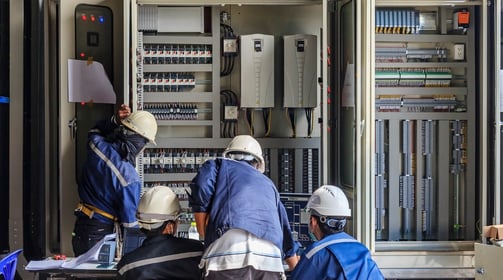Applying smart maintenance systems in asset and facility management
Blog post description.
الصيانة والتشغيل والهندسة الفنية
1/3/20243 min read
Applying smart maintenance systems in asset and facility management


Introduction:
The "Application of Smart Maintenance Systems in Asset and Facility Management" course is a valuable resource for professionals seeking to enhance the efficiency and effectiveness of asset and facility management by employing smart maintenance techniques. In a world where operational complexities are increasing, and the pace of technology is accelerating, this course provides a comprehensive approach to understanding how to use smart systems, including big data, artificial intelligence, and Internet of Things (IoT) technologies, to improve maintenance processes and asset management. Participants will learn how to effectively integrate these technologies into daily operations to maximize the benefits of assets and ensure their sustainability. They will gain skills in performance analysis and apply predictive and preventive maintenance strategies to reduce downtime and increase equipment lifespan.
The course will also focus on improving safety, efficiency, and reducing operational costs through the use of smart maintenance systems. Additionally, it will provide a comprehensive overview of how to integrate these systems with existing infrastructure and address challenges that may arise during implementation and operation. This course aims to empower professionals to apply their knowledge practically and effectively, enhancing their ability to manage assets and facilities efficiently and sustainably in the contemporary work environment.
Course Objectives:
By the end of the course, participants will be able to:
Understand the principles and techniques of smart maintenance, such as big data and artificial intelligence.
Learn how to integrate smart maintenance techniques into asset management to improve efficiency and sustainability.
Develop strategies for improving predictive and preventive maintenance to reduce downtime and enhance equipment lifespan.
Use smart systems to improve safety and operational efficiency.
Focus on strategies to reduce operational costs through effective maintenance systems.
Understand how to integrate smart systems with existing infrastructure and address challenges during implementation and operation.
Training Methodology:
The training methodology in the "Application of Smart Maintenance Systems in Asset and Facility Management" course is characterized by an effective balance between theoretical learning and practical application. The course begins by introducing fundamental concepts of smart maintenance systems, with a focus on big data, artificial intelligence, and IoT. Real-world case studies and interactive scenarios are used to illustrate how to integrate these technologies into asset and facility management. Workshops and group discussions are crucial components of the course, providing participants with opportunities to apply knowledge in various operational contexts, enhancing practical understanding and immediate application. The importance of critical analysis and problem-solving is emphasized, with a special focus on identifying effective strategies to improve maintenance processes and operational efficiency, ensuring participants derive maximum benefit from the training and successfully apply it in their work environments.
Program Content:
Introduction to Smart Maintenance Systems:
Understanding smart maintenance and its significance.
Big data techniques and their impact on maintenance.
Artificial intelligence and its applications in maintenance.
Internet of Things (IoT) techniques in maintenance.
Advantages and challenges of adopting smart maintenance.
Planning and Managing Maintenance using CMMS:
Introduction to CMMS systems and their key functions.
Maintenance planning strategies in CMMS.
Scheduling and organizing maintenance tasks.
Data analysis and information management.
Integrating CMMS with other management systems.
Data Analysis and Predictive Maintenance:
Fundamentals of data analysis in maintenance.
Developing predictive maintenance models.
Using analytics to improve decision-making.
Continuous monitoring and immediate diagnosis.
Minimizing failures and increasing efficiency.
Continuous Improvement and Performance Management:
Principles of continuous improvement in maintenance.
Evaluating and monitoring maintenance performance.
Applying improvement tools such as Lean and Six Sigma.
Quality management practices in maintenance.
Identifying and analyzing key performance indicators.
Safety and Security in Smart Maintenance Systems:
Importance of safety in maintenance systems.
Risk management and preventive measures.
Compliance with industry and regulatory standards.
Training employees on safety and security.
Assessing and improving a safe working environment.
Systems Integration and Change Management:
Strategies for integrating smart systems.
Change management in maintenance environments.
Effective communication during the change process.
Training and developing the workforce.
Measuring impact and evaluating success.
Sustainability and Future Maintenance:
The role of maintenance in achieving sustainability.
Environmentally friendly techniques in maintenance.
Keeping up with innovations and future trends.
Developing long-term maintenance strategies.
Impact of new technology on asset management.
Enhancing Maintenance Management Efficiency, Problem Solving, and Decision Making:
Methods for improving maintenance management processes.
Updating maintenance management procedures.
Analyzing and improving maintenance management data.
Achieving actual efficiency in problem solving and decision making.
Continuous improvement in managing and developing maintenance systems.
Practical case studies.
The Fifth Settlement - N 90th Street - Trivium Business Complex - Third Floor - 332
New Cairo City, Egypt
